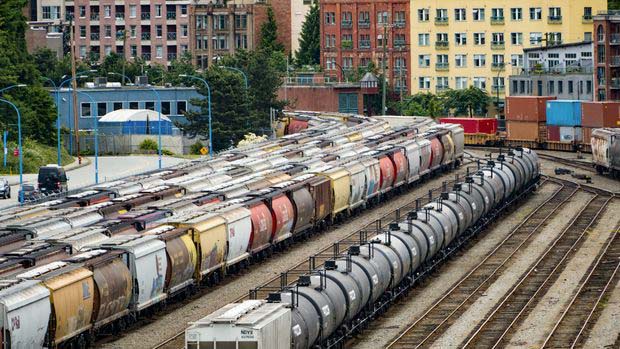
Vancouver British Columbia - It was billed as an investigation into possible rail-service problems at Canada's most important port, the
first hearing of its kind held by the Canadian Transportation Agency (CTA).
Instead, representatives of Canada's two major railways tried to turn the tables on the regulator, mounting defences of their service to shippers at the
Vancouver port and questioning the need for government scrutiny and a public airing of customer complaints over two days at a downtown hotel on
Tuesday.
The CTA launched the investigation after complaints of poor service by shippers that rely on railways to reach the port of Vancouver and overseas
buyers.
The groups, representing shippers of forest products, potash, and crops, say the railways are giving priority to certain commodities while halting their rail
cars, forcing them to incur charges for idle ships and rail cars and unfilled contracts.
The port of Vancouver is Canada's busiest, moving 142 million tonnes of grain, consumer goods, and other products in 2017, and is a key gateway to Asian
markets.
The hearing called by the quasi-judicial regulator of the air travel, marine, and rail industries is scheduled for Tuesday and Wednesday.
The CTA has the power to issue orders against industry members to ensure the transportation system works in the interest of customers, businesses, and people
who rely on it.
Representatives of the three major railways that serve the port, BNSF, CN, and CP took turns defending their respective company's performance on
Tuesday.
Any slowdown in freight movement was brief, beyond our control, and temporary, was their message.
In any case, BNSF and CP said the slowdown stemmed from congestion at the CN freight yard.
"I wish to reiterate CP's concern as to the lack of foundation, evidentiary or otherwise, on which this investigation has been initiated," said
Cassandra Quach, counsel for CP.
"We are unaware of any accusations that we have not fulfilled our service obligations in the Vancouver area."
Fiona Murray, vice-president of public and government affairs for CN, told the CTA panel that November and December's 10 percent rise in rail traffic in the
Vancouver area created congestion that, if not controlled through restrictions on train movement, could have rippled across the wider Canadian and U.S. supply
chains.
She called the suggestion the railway discriminates against certain commodities "incorrect," and demonstrates a misunderstanding of "how and
why" railways manage traffic under "exceptional circumstances."
"Our operations in the Vancouver area are fluid. Please note that I did not say perfect," said Ms. Murray, who called criticism of the port's
operations "irresponsible and potentially damaging" to Canada's international reputation as a reliable trading partner.
Generally, CN operates trains to the port's north shore, while CP serves the south, the carriers interchange or swap trains, locomotives, and crews to keep
rail traffic moving smoothly.
For this reason, congestion at CN's yard cascaded through the region and caused CP traffic to slow.
Greg Squires, a CP manager, said CP restricted or halted some freight operations near the port three times in December due to congestion on CN lines, to avoid
seeing customers' freight "trapped" in clogged rail yards.
The CTA panel is scheduled to hear testimony from groups representing railway customers, terminal operators, and the port of Vancouver.
As the hearing's first day wound down, CN reported financial results after markets closed.
For the three months ended 31 Dec 2018 CN said profit fell by 55 percent to $1.14 billion, or $1.56 a share, from the fourth quarter of 2017, a period in which
the company received a U.S. tax break.
Revenue rose by 16 percent to $3.8 billion.
On an adjusted basis, CN's per-share profit rose by 24 percent to $1.49 a share, or $1.1 billion.
Analysts expected per-share profit of $1.47.
Eric Atkins.
provisions in Section 29 of the Canadian
Copyright Modernization Act.

